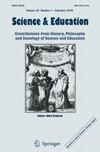Exploring Science Identity Development of Women in Physics and Physical Sciences in Higher Education
Abstract
This study investigates women’s science identity development in physics and the physical sciences in higher education through a gender perspective. It arises from the real-life sociological issue of women’s lower level of participation in physics and physical sciences in Ireland, where the gender gap is the highest of all science disciplines, according to the Higher Education Authority (HEA) reports of recent years. Twenty-nine undergraduate, graduate students, and postdoctoral researchers from four Dublin universities were interviewed to achieve an in-depth understanding of gender and science issues from their standpoints. The focus was on how they constitute their identities as a ‘scientist’ in relation to their gender. The result of this study illustrates a variety of possible science identity constitutions of women both from an individual and collective identity perspective. Understanding women’s science identity development help brings a general view about developing a more welcoming and flexible science culture for individuals who think they do not fit well or who are left outside of the certain prevailing norms in the scientific climate. It also can allow seeking a way of challenging and changing the predominant culture and the prevailing masculine norms in doing science.

 求助内容:
求助内容: 应助结果提醒方式:
应助结果提醒方式:


